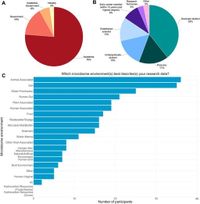The rapid growth of microbiome research has ushered in innovative approaches to study complex microbial communities, yet many datasets remain hard to compare or reuse due to inconsistent standards. In response, the National Microbiome Data Collaborative (NMDC) launched its Ambassador Program in 2021 to improve data stewardship practices through community-led workshops and training.
The 2023 cohort of NMDC Ambassadors, comprised of 13 participants, hosted 21 workshops across three countries— the USA, Canada, and Japan—reaching over 550 researchers. These hands-on events focused on enhancing knowledge about microbiome metadata standards and data management practices. Following the workshops, a survey collected feedback from 122 participants; results indicated overwhelmingly positive experiences, with 98% of respondents reporting new learning outcomes.
Participants reported significant increases in their understanding of metadata standards and principles for effective microbiome data management. Among the attendees, 86% noted greater familiarity with FAIR data principles, which promote Findable, Accessible, Interoperable, and Reusable datasets. As microbiome research generates complex data vital for understanding systems ranging from human health to agriculture, the emergence of such standards is crucial.
The Ambassador Program initially focused on metadata standards but has since expanded to encompass a broader spectrum of data stewardship best practices. Ambassador-led events included practical exercises using NMDC products, thereby facilitating deeper engagement with the content.
A survey administered after each workshop measured participant satisfaction and knowledge gained. Impressive metrics revealed that 95% felt the content was helpful and aligned with their existing knowledge levels, while 99% expressed intentions to apply new concepts about data stewardship in their own work. Notably, 93% reported enhanced familiarity with NMDC as an organization, furthering community engagement.
Comments from participants echoed the program's success, highlighting how the hands-on format made the information engaging and relatable. For example, one participant noted, "The organization and initiatives were great," while others appreciated the content's accessibility across diverse backgrounds and experience levels. Challenges arose, especially in virtual formats, but efforts to adapt materials ensured inclusivity throughout the workshops.
Moving forward, the NMDC intends to refine its training programs based on participant feedback, incorporating lessons learned from these workshops. Overall, the continuation of programs like the NMDC Ambassador initiative is fundamental for cultivating best practices in microbiome research, enhancing the quality of future scientific outputs. As microbiome data stewardship emerges as a priority within the scientific community, so too will the opportunities for innovation, paving the way for fruitful research in the coming years.

